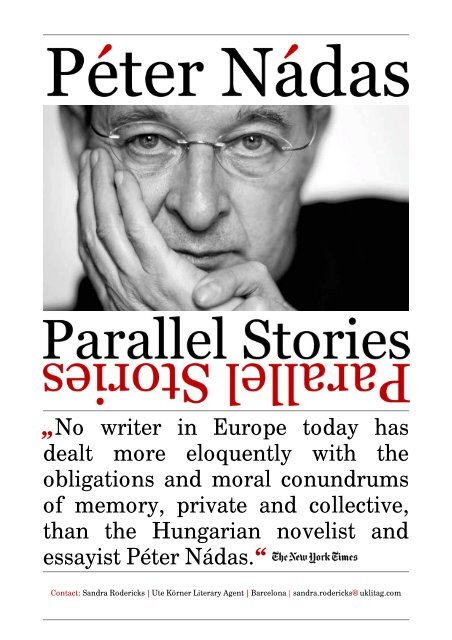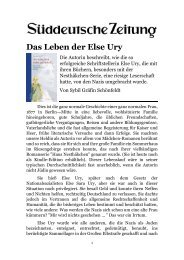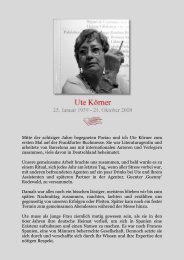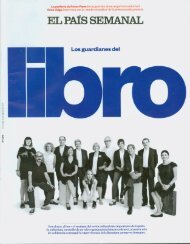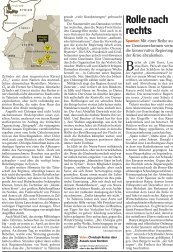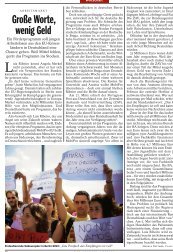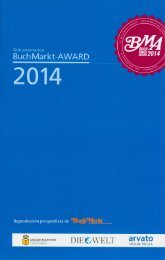Create successful ePaper yourself
Turn your PDF publications into a flip-book with our unique Google optimized e-Paper software.
„No writer in Europe today has<br />
dealt more eloquently with the<br />
obligations and moral conundrums<br />
of memory, private and collective,<br />
than the Hungarian novelist and<br />
essayist Péter Nádas.“<br />
Contact: Sandra Rodericks | Ute Körner Literary Agent | Barcelona | sandra.rodericks@uklitag.com
… is Péter Nádas’s opus magnum, a virtuoso<br />
combination of nineteenth-century realism with the<br />
experimentalism of the nouveau roman.<br />
The interwoven narrative is spanning Eastern and<br />
Western Europe from the early 1960s to the fall of the<br />
Berlin Wall, and is powered by the twin forces of<br />
politics and eroticism.<br />
… is more than the sum of its plot lines: it is a<br />
multitude of independent stories, parallel stories, that<br />
is melting into one single narrative circling around a<br />
German and Hungarian family history.<br />
„A pensive, beautifully written tour de force of<br />
modern European literature, worthy of shelving<br />
alongside Döblin, Pasternak and Mann.“
Edition | USA<br />
Farrar, Straus & Giroux<br />
Edition | UK<br />
Jonathan Cape<br />
Edition | Germany<br />
Rowohlt<br />
Edition | Sweden<br />
Bonniers<br />
Edition | Slovakia<br />
Kalligram<br />
Edition | Hungary<br />
Jelenkor Kiadó<br />
Further translations are in preparation:<br />
French | Plon Dutch | Van Gennep Norwegian | Agora Croation: Fraktura
… was born in 1942 in Budapest. The novelist, essayist, and<br />
dramatist is considered as a major central European literary figure.<br />
After dropping out of school, Péter Nádas turned to<br />
photojournalism. While working as an editor, reader and drama<br />
consultant in the late 1960s and early 1970s, he started as a writer of<br />
short stories where he often returns to his childhood experiences.<br />
Péter Nádas made his international breakthrough with the<br />
monumental, psychological novel A Book of Memories (1986).<br />
Susan Sontag: „The greatest novel written in our time, and one of<br />
the great books of the century.“<br />
Péter Nádas has received several literary awards, such as the Franz<br />
Kafka Literature Prize (2003), the Vilenica Prize for Literature<br />
(1998), the Austrian State Prize for European Literature (1991) and<br />
the Prize for Hungarian Art (1989).<br />
A Book of<br />
Memories<br />
publ. 1986<br />
sold to 9 languages<br />
Own Death<br />
publ. 2004<br />
sold to 15 languages<br />
The End of a<br />
Family Story<br />
publ. 1977<br />
sold to 19 languages<br />
Fire and<br />
Knowledge<br />
publ. 2004<br />
sold to 8 languages<br />
Backlist | <strong>Selection</strong><br />
Link <strong>Selection</strong> | Reviews
Hilde-Domin-Preis 2013<br />
an<br />
Abbas Khider
Abbas Khider<br />
Letter to the<br />
Eggplant Republic<br />
Edition Nautilus · Hamburg, 2013 · 160 pages<br />
<br />
This novel tells about a love letter’s journey from<br />
Bengasi, Libya, to Bagdad, Iraq.<br />
A clandestine network of taxi drivers, truckers and<br />
travel agencies transports illegally letters written by<br />
emigrants and refugees.<br />
But Saddam’s intelligence service already knows<br />
about this network and intercepts the letters.<br />
Abbas Khider draws a tableau of the Arab World<br />
at the end of the 20th century, when Saddam,<br />
Mubarak, Gaddafi et al. were still in place and the<br />
twitter and facebook revolutions seemed<br />
unimaginable.
Abbas Khider<br />
Oranges from the<br />
President<br />
Edition Nautilus · Hamburg, 2011 · 160 pages<br />
<br />
Young Mahdi spent two years in prison during<br />
Saddam Hussein’s regime, even though he is<br />
innocent, as even the police admit.<br />
The novel tells about the the infernal daily routine<br />
in captivity, but also about Mahdi’s former life as a<br />
pigeon fancier and zealous reader, when the future<br />
seemed wide open to him.<br />
In 1991, Mahdi is freed from prison by partisans,<br />
but hiscountry is not any more as he knew it – he<br />
decides to flee.
Abbas Khider<br />
The Village Indian<br />
Edition Nautilus · Hamburg, 2008 · 160 pages<br />
<br />
The narrator in this novel comes across a script in<br />
Arabic language while he travels from Munich to<br />
Berlin. Miraculously it tells his very own story even<br />
though the main character has another name.<br />
Rasul Hamid, the protagonist, describes in eight<br />
different ways how he fled his homecountry Iraq and<br />
tries to live as a refugee. He strays between Northern<br />
Africa and Europe, but he never feels anywhere at<br />
home again.<br />
The voices and fates in this debut novel tell a realistic<br />
fairy tale. Abbas Khider combines the tragic with a<br />
laugh, the grotesque with ordinary life. This novel is<br />
the story of his life and impresses by its unadorned<br />
point of view and his en-passant-way of narrating the<br />
misery.<br />
Rights sold: English language rights world to Iran,<br />
India; Arab language rights.<br />
English edition
Abbas Khider<br />
was born in 1973 in Baghdad. In the 1990s he was<br />
imprisoned for two years for ‘political reasons’, and<br />
fled the country in 1996.<br />
Between 1996 and 1999 he sought refuge illegally in<br />
several countries, finally settling in Germany in<br />
2000.<br />
Khider studied Philosophy and Literature in<br />
Munich and Potsdam, and currently lives in Berlin.<br />
He has won numerous prizes for his poetry and<br />
prose, including the Adelbert von Chamisso Prize<br />
for the Most Promising Young Writer, 2010, and in<br />
2013 the Hilde Domin Prize for literature in exile.<br />
www.abbaskhider.com
The press says:<br />
The Village Indian:<br />
»The author is a master of grotesque satire, navigating<br />
elegantly between laughter and tears.«<br />
»A novel, a fairy story, a tale from 1001 Nights, a short<br />
story and autobiography all in one. «<br />
»What a deeply sad book – yet every single page makes<br />
the reader happy.«<br />
Oranges from the President:<br />
»Abbas Khider is an incredibly sophisticated narrator.«<br />
»A strong and moving text, an eye-opening book.«<br />
»Khider's artfully constructed novel is a literary and<br />
dramaturgical masterpiece.«<br />
Letter to the Eggplant Republic:<br />
»No other German author writes so lucidly and empathetic<br />
about the Arab world.«<br />
Contact:<br />
Ute Körner Literary Agent | Barcelona<br />
sandra.rodericks@uklitag.com | www.uklitag.com
Dirk Müller is Germany’s ‘Mister Dax‘. The most plausible, informative and<br />
most useful books on money and economics ever! +++ Dirk Müller writes<br />
the way he talks: easygoing, casual and witty. +++ Dirk Müller translates<br />
complexe finance linguistics into simple language. +++ Dirk Müller’s<br />
newest book Showdown = #1 on<br />
bestseller list.
WE ALL KNOW THE FEELING OF NOT UNDERSTANDING<br />
the finance market anymore – confronted with an ever growing<br />
number of rapidly changing facts, conflicting recommendations,<br />
investment opportunities and the anonymity of the market, what<br />
many people decide to do with regards to their savings is:<br />
nothing.<br />
THIS IS WHERE DIRK MÜLLER COMES IN!<br />
The bestselling author and today’s most popular expert on<br />
current economic challenges is not called the face of the stock<br />
exchange for<br />
nothing.<br />
With ease, wit and clarity, he provides deep insights into how the<br />
systems function and why – until even complete beginners are<br />
able to take their financial destiny into their own hands!<br />
„If my financial adviser had only once been this clear in<br />
discussing financial operations with me, my trust in financial<br />
institutions would not have collapsed so dramatically. Instead, for<br />
Finance Dummies, there’s now this valuable book.“
„People trust Dirk Müller“<br />
„In clearly structured<br />
chapters Dirk Müller<br />
disentangles complex<br />
market mechanisms and<br />
correlations for the<br />
finance & economics<br />
amateur.<br />
Müller writes the way he<br />
talks: easygoing, casual<br />
and witty.“<br />
Dirk Müller<br />
SHOWDOWN<br />
The Struggle<br />
for Europe and Our Money<br />
Droemer | München, 2013 | 272 pages<br />
Dirk Müller<br />
CASH COURSE<br />
How to Make<br />
the Most of Your Money: Stocks,<br />
Insurances, and Real Estates<br />
Droemer | München, 2011 | 384 pages<br />
Dirk Müller<br />
CRASH COURSE<br />
World Economic Crisis or<br />
Opportunity of the Century?<br />
How to make the most of your money<br />
Droemer | München, 2009 | 304 pages<br />
Contact:<br />
Ute Körner Literary Agent | Barcelona<br />
sandra.rodericks@uklitag.com | www.uklitag.com
300,000 COPIES SOLD<br />
Contact: Ute Körner Literary Agent | Barcelona | sandra.rodericks@uklitag.com | www.uklitag.com
Sveva Casati Modignani<br />
LÉONIE<br />
Sperling & Kupfer · Milano, 2012<br />
500 pages<br />
Sold to: France, Germany, Portugal, Serbia<br />
There’s no place like a beautiful, ancient villa where to<br />
hide your secrets.<br />
In a great mansion at the outskirts of Milan, live the<br />
Cantonis, owners for three generations of a renowned<br />
pipe manufacturing plant going by the same name.<br />
Apparently, the family’s personalities are straightforward.<br />
In reality, each of them hides secrets and scars. With<br />
them, it’s a rule: some things, however well-known, are<br />
not to be discussed. They even keep silent about the<br />
madness streak in Bianca, the dynasty’s matriarch.<br />
One day Léonie Tardivaux walks on the scene, a young<br />
and penny-less French girl who marries Guido Cantoni,<br />
Bianca’s only grand-son. In taking her place within the<br />
family, Léonie also takes up its life-style, including the<br />
law of silence on certain private happenings.<br />
Nevertheless she is a perfect wife, a caring mother, a<br />
talented manager, successfully steering the company in<br />
the hostile environment of economic recession. But in<br />
the meantime, she harbors her secret, which every year,<br />
for one day only, drives her away from it all, to seek<br />
shelter in a romantic hotel on Lake Como.<br />
Sveva Casati Modignani captures her readers with a saga<br />
extending over almost a century of Italian history, and a<br />
host of fascinating characters: intelligent, authentic and<br />
assertive men alongside strong women, their<br />
irreplaceable advisors and staunch supporters.
Sveva Casati Modignani is one of the most beloved Italian authors of popular<br />
women fiction, her books always hitting the top positions of the best-selling list.<br />
Sveva Casati Modignani’s last work Léonie is making no exception, reaching<br />
even the best sales values of the last years with over 300.000 copies sold and 20<br />
weeks in the best selling list!<br />
Sveva Casati Modignani has the gift to reach a huge public with novels set across<br />
different generations, usually covering nearly a century and exploring the big<br />
social and economical changes who took place in the past and recent years.<br />
Sveva Casati Modignani’s heroines are determined and practical women who<br />
find the courage to challenge society (and men!) in order to stay true to their<br />
dreams and to their principles.<br />
Sveva Casati Modignani’s characters show all possible human nuances in the<br />
simplest way, and her colourful plots keep the reader stuck to the book till the<br />
last page. True love, the fight against injustice, the reward to positive feelings and<br />
above all the efforts for social affirmation are the main themes of her books.<br />
Sveva Casati Modignani’s style is straightforward, ironic and enjoyable.<br />
Sveva Casati Modignani: Over 30 years of overwhelming success + 22 longselling<br />
novels + Over 10 million copies sold + Translated into 20 languages +<br />
Several of her novels were made into movies<br />
www.svevacasatimodignani.it
Sveva Casati Modignani<br />
More books & Foreign sales<br />
Contact: Ute Körner Literary Agent | Barcelona | sandra.rodericks@uklitag.com | www.uklitag.com
Presents:<br />
New Scenic<br />
Novels
Un amor que no puede ser.<br />
Tessa White:<br />
LA ISLA DE LAS<br />
ORQUÍDEAS<br />
Knaur<br />
München, 2012<br />
550 páginas<br />
Cuando las hermanas Leah y Johanna llegan a Singapur<br />
en 1856 no intuirán que la ciudad les marcará el destino.<br />
Johanna aceptará la mano del hombre de negocios<br />
Friedrich von Trebow sin darse cuenta del amor que otro<br />
hombre siente por ella.<br />
Leah se enamorará de un hombre chino: un amor que no<br />
puede ser. Cuando los amantes tienen que separarse,<br />
Leah emprenderá un peligroso viaje en busca de<br />
reconocimiento, de felicidad y de sí misma…
Una apasionante saga familiar ante un paisaje exótico.<br />
Micaela Jary:<br />
LA BAHÍA DEL<br />
FUEGO AZUL<br />
Goldmann<br />
München, 2013<br />
448 páginas<br />
Entre Europa y África, desierto y mar: una apasionante saga<br />
familiar ante un paisaje exótico.Berlin 1909: cuando la joven<br />
Emma Thieme descubre que su madre, a quien creía muerta,<br />
vive en el sudeste de África, emprenderá de inmediato el<br />
largo viaje. La acompañará la pianista Dorothee von<br />
Hirschberg, quien tiene previsto dar varios conciertos en la<br />
colonia. Durante el viaje las dos mujeres conocerán al<br />
atractivo Manfred von Paschen y al obscuro Ernst Keller. Ni<br />
Emma ni Dorethee intuirán que ambos hombres cambiarán<br />
sus vidas y que además serán la clave para desvelar el secreto<br />
entorno a la madre de Emma y un diamante desaparecido.
Huyó del pasado y encontró el paraiso...<br />
Sarah Benedict:<br />
EL AROMA DE<br />
LA PAPAYA<br />
VERDE<br />
Blanvalet<br />
München, 2013<br />
576 páginas<br />
Bajo la luz brillante del sol Evelyn Braams llegará a Samoa en<br />
una avioneta de hélices.<br />
Ha dejado atrás su vida en Alemania para tratar de olvidar<br />
recuerdos dolorosos. En una bahía solitaria se hospedará en<br />
casa de dos ancianas y rápidamente se hará amiga de la<br />
entrañable Ili.<br />
Ésta teme por sus propiedades ya que su prima Moana las<br />
quiere vender a un inversor americano, por venganza. Evelyn<br />
intenta ayudarla y con ello acabará involucrándose cada vez<br />
más en acontencimientos que la transportarán a antiguas<br />
historias de amor y odio...<br />
La novela narra la dramática historia de amor entre ayer y<br />
hoy en el escenario de la fascinante historia colonial alemana<br />
en la isla de ensueño del pacífico sur, Samoa.
Una intrigante saga familiar e<br />
historia de amor en el marco de Gibraltar.<br />
Laila El Omari:<br />
EL CIELO<br />
PÚRPURA<br />
Knaur<br />
München, 2011<br />
540 páginas<br />
Londres, 1778. Olivia Kilbourne lleva una vida entre algodones<br />
como hija de un oficial.<br />
Su vida cambiará cuando su padre sea trasladado a Gibraltar,<br />
tierra marcada por la fusión de varias culturas<br />
El nuevo entorno parece afectar a la familia: sus padres no<br />
dejan de discutir y tanto su herman enferma como su<br />
hermano parecen ocultarle algo.<br />
Cuando el oficial John Retallick empieza a cortejarla, Olivia<br />
decide casarse con él para poder volver a Inglaterra. Pero<br />
empezará la guerra y John tendrá que marcharse.<br />
Pero Olivia sospecha que John conoce a su hermana Ruby de<br />
antes y finalmente acabará descubriendo el terrible secreto<br />
de su pasado.
Dos amigos. Un destino. Un amor que nunca muere...<br />
Sylvia Lott:<br />
LA ROSA DE<br />
DARJEELING<br />
Blanvalet<br />
München, 2013<br />
600 páginas<br />
Darjeeling, años treinta del s.XX. Kathryn, una joven inglesa<br />
llena de sueños vive en la plantación de te de su padre.<br />
Estará encantada cuando dos viajeros alemanes hagan<br />
parada en su casa: el atractivo Gustav, interesado en entablar<br />
contacto con el comercio de te, y su mejor amigo Carl, en<br />
busca de una nueva especie de rododendro.<br />
A pesar de encontrarse con diversas oposiciones, seguirá a los<br />
dos jóvenes en su peligrosa expedición al Himalaya, y será<br />
entonces donde se dará cuenta de a quién de verdad<br />
pertenece su corazón.<br />
Mientras, la plantación de su padre está al borde de la ruina y<br />
en Alemania empezará la guerra...
Un amor oculto.<br />
Isabel Alfaro:<br />
EN EL VALLE<br />
DE LA LUNA DE<br />
AZAFRÁN<br />
Knaur<br />
München, 2013<br />
550 páginas<br />
La joven inglesa Sybilla Spencer se mudará, junto a su<br />
marido, a la ciudad africana de Mogador, uno de los puertos<br />
más importantes del norte de áfrica.<br />
Allí pronto empezará a disfrutar del exotismo de la ciudad.<br />
Pero los negocios sucios de su marido y un amor oculto<br />
amenazarán en destruir su matrimonio.
Colores como los de Las 1001 Noches.<br />
Micaela Jary:<br />
NOSTALGIA<br />
DE ZANZÍBAR<br />
Goldmann, 2013<br />
448 páginas<br />
El olor a especies exóticas; colores como los de Las 1001<br />
Noches; una Isla llena de nostalgia: Zanzíbar<br />
1888 a bordo de un barco de vapor dirección al este de África:<br />
Viktoria Wesermann, la poco convencional hija de Reeder, la<br />
investigadora Antonia Gesenfelder y la consentida Juliane<br />
von Braun traban amistad.<br />
Cada una de ellas buscará su suerte en la exótica isla de las<br />
especies, Zanzíbar.<br />
Pero pronto acabarán las tres inmersas en un intercambio de<br />
sentimientos pasionales, desequilibrantes y embriagadores, y<br />
en la división entre el sueño oriental y las sombras del trato<br />
de esclavos, revoluciones sanguinarias y el cólera…
Buscar mil aventuras y peligros en Alaska.<br />
Norah Sanders:<br />
EN EL<br />
CORAZÓN DE<br />
LA SELVA<br />
Bastei Lübbe<br />
Köln, 2013<br />
720 páginas<br />
1899. Shannon Tyrell regresa a su hogar en San Francisco<br />
tras unos años de viajes, para apartarse de la familia y de un<br />
matrimonio de conveniencia que no aceptó.<br />
A su regreso, su familia, poseedora de un gran imperio<br />
comercial, le vuelve a concertar matrimonio.<br />
Mientras Shannon se enamorará de un desconocido que, sin<br />
saberlo, es el marido que le han buscado.<br />
Jay huriá a Alaska para evitar el matrimonio concertado sin<br />
saber que Shannon está embarazada. Y ella le irá a buscar<br />
viviendo mil aventuras y peligros hasta llegar a Alaska…
Para Pedir Ejemplares de Lectura & Más Información:<br />
Sandra Rodericks · Ute Körner Literary Agent, S.L.<br />
Aragó, 224-Pral-2 · 08011 Barcelona<br />
T: 93 323 89 70 · sandra.rodericks@uklitag.com<br />
www.uklitag.com
YOU<br />
ARE<br />
WHAT<br />
YOU<br />
EAT<br />
> 750.000 COPIES SOLD
Guaranteed Hazardous<br />
to Your Health<br />
How the Sugar Mafia makes us ill<br />
Droemer<br />
München, 2013<br />
304 pages<br />
more info<br />
„We are what we eat!“<br />
A phrase that for most merely sounds like a harmless appeal to<br />
a sensible approach to food ... Once you’ve read Hans-Ulrich<br />
Grimm, it sounds both scary and threatening: For many years<br />
the uncoverer and bestselling author has made it his mission to<br />
warn consumers against the dangers of the food industry.<br />
For his new book, Guaranteed Hazardous to Your<br />
Health: How the Sugar Mafia Makes Us Ill, Grimm<br />
describes the enormous health risks from too much sugar<br />
consumption and targets the “Sugar Mafia”, an ominous<br />
network of industry, a practice of subsidies, influenced<br />
politicians, paid-for research and lobbyism.<br />
Since its release in March, the book sold more than 40.000<br />
copies and has now been on the<br />
bestseller list<br />
continuously for 7 weeks (4 of which in the Top Ten).<br />
The total number of Grimm copies published in Germany<br />
amounts to more than 750.000 copies; translation rights<br />
have been sold to France, Italy, Czech Republic, Poland,<br />
Hungary, Latvia, Russia, Korea, China and Japan.
Allergies, Behavioural Disorders<br />
and Alzheimer’s Disease:<br />
Additives may ruin one’s health<br />
Where does the taste come from in ready-to-serve meals?<br />
What puts the colour in sweets? We have all heard of additives<br />
such as glutamate and aspartame.<br />
But what does all this really mean, and what is behind E 965, E<br />
650 and all the other contents referred to in the smallprint? It is<br />
clear that the wonderful world of chemistry is not only a danger<br />
to the heart and the brain – it may even be fatal.<br />
This standard work on chemicals in one’s food is an<br />
encyclopaedia of food additives and their dangers, especially to<br />
highrisk groups.<br />
Extremely helpful required reading for anyone who wishes to<br />
know what it is he eats.<br />
A Grimm “classic” on food additives, but now in a<br />
completely revised new edition<br />
More than 200.000 copies sold in Germany<br />
Chemicals in Food<br />
How they work, why they damage<br />
Knaur<br />
München, 2013<br />
320 pages
An investigative journalist looks<br />
into the food industry’s promises<br />
What is »healthy« food?<br />
Cucumbers, lettuce, and tomatoes from the farmer’s<br />
market?<br />
Or enriched foods from the grocery store that are<br />
vitaminrich, lowcholesterol, probiotic, and iodized,<br />
and not only taste good, but also fill us up without<br />
making us fat and are supposed to be so healthy that<br />
they increase our life expectancy?<br />
110.000 copies sold in Germany<br />
Unfit for Consumption<br />
How the Health Food Industry<br />
makes us sick<br />
Droemer<br />
München, 2012<br />
320 pages<br />
Foreign rights to:<br />
Poland, Latvia, Hungary, Korea
The Nutrition Lie<br />
How the Health Food Industry<br />
makes us crazy<br />
Droemer<br />
München, 2012<br />
320 pages<br />
160.000 copies sold in Germany<br />
Foreign rights to: France and Korea<br />
The Soup Is Lying<br />
The brave new world of eating<br />
Knaur<br />
München, 1999<br />
New edition: 2008<br />
224 pages<br />
250.000 copies sold in Germany<br />
Dr. Hans-Ulrich Grimm<br />
is an author and journalist. His year-long research in<br />
the world of industrialized foodstuffs resulted in his<br />
emptying his kitchen of all the products<br />
manufactured by Nestle, Knorr, etc, in favour of fresh<br />
goods from the markets and farmers.<br />
This taught him that good food and health belong<br />
together.<br />
Contact:<br />
Ute Körner Literary Agent | Barcelona<br />
sandra.rodericks@uklitag.com | www.uklitag.com
R I G H T S A U T U M N 2 0 1 2<br />
UTE KÖRNER LITERARY AGENT, S.L. · ARAGÓ, 224 - PRAL - 2 · 08011 BARCELONA · SPAIN<br />
T: +34 93 323 89 70 · F: +34 93 451 48 69 · OFFICE@UKLITAG.COM · WWW.UKLITAG.COM
Capitalism out of control<br />
POLITICS<br />
WAR OF<br />
FINANCES<br />
Attack on the<br />
Social Peace<br />
in Europe<br />
Frankfurt | 2012<br />
270 pages<br />
The international capital markets have targeted whole<br />
states and follow a concise strategy of profit maximization.<br />
In doing so, they accept the risk of terminating the peacebuilding<br />
order of the last decades.<br />
Can we get this explosive situation under control again?<br />
Wolfgang Hetzer explains.<br />
Today, the capitalism has become a serious threat to the<br />
stability of the economic system.<br />
Immoral financial market actors and weak politicians have<br />
not just lead to an wide destruction of national wealth, but<br />
also to a beginning hostility between states which actually<br />
confederated after the catastrophe of two world wars.<br />
Wolfgang Hetzer is a doctor of law and was head of<br />
department at the European Anti-Fraud Office (OLAF) until<br />
2012.<br />
Previously, he has been in charge of the German Secret<br />
Service (BND) where he was responsible for organized crime<br />
and international money laundering.
The fastest men are going to win, not the best ones.<br />
SOCIETY<br />
RESISTANCE<br />
AGAINST THE<br />
REGIME OF<br />
ACCELERATION<br />
Frankfurt | 2012<br />
288 pages<br />
Too little time to be with the children, to relax and to<br />
celebrate – these complaints are not only heard from<br />
housewives and managers, but also from pupils and<br />
students.<br />
How come that an additional speed boost has roughed up<br />
our society? What are the causes? And – particularly<br />
important – who suffers from the consequences?<br />
The author traces the causes for the imperial regime of<br />
speed. He recognizes a complex chain of causes. So, how<br />
can we limit the risk of a rapid acceleration? How can the<br />
different social systems like politics, education and family<br />
fend the encroachment of the financial and economic<br />
system?<br />
Friedhelm Hengsbach pleads for a human and social<br />
measure of time that should replace economic growth as an<br />
indicator of property.<br />
Friedhelm Hengsbach is a member of the Jesuit Order. Until<br />
2006 he was Professor of Christian Social Ethics at the<br />
Philosophical and Theological High School St. Georgen in<br />
Frankfurt/Main and head of the Oswald von Nell-Breuning<br />
Institute for Business and Social Ethics.<br />
He lives and works in the Catholic Academy Rhine-Neckar in<br />
Ludwigshafen.
The rich get richer and the poor get poorer<br />
POLITICS<br />
0,1% - THE EMPIRE<br />
OF THE<br />
BILLIONAIRES<br />
Frankfurt | 2012<br />
256 pages<br />
On average, the richest 0.1 percent of the West European<br />
have trebled their assets in the last fifteen years. A<br />
comparatively low number of individuals is spread over the<br />
whole world like a network. As investors, they have<br />
unbelievable, uncontrollable power.<br />
This book is about the top 0.1 percent of the West European<br />
– the super-rich. World’s money gravitates towards them<br />
like into a black hole. And money means power.<br />
This power changes attitudes, life plans and behaviours<br />
profoundly, because the power of money is an imperial<br />
structure. Thus billionaires become a global class of their<br />
own whether we or they like it or not.<br />
Hans-Jürgen Krysmanski answers the essential question:<br />
What does unlimited wealth do with the super-rich, with us<br />
and with our democratic society?<br />
Hans-Jürgen Krysmanski taught Sociology at the University<br />
of Münster until 2001.<br />
He was a member of the presidium of the World Peace<br />
Council and he still is a member of the academic advisory<br />
board of Attac and The-Rosa-Luxemburg-Foundation.
Jutta Ditfurth - A tireless combatant for a just society<br />
POLITICS<br />
TIME<br />
OF<br />
RAGE<br />
Frankfurt | 2012<br />
294 pages<br />
How to free ourselves from capitalism - A huge rage crosses<br />
the country. Who stands up for justice today? Who<br />
establishes a border against the uncontrollable capitalism?<br />
Who fights poverty and the destruction of nature?<br />
Jutta Ditfurth balances accounts: with people, who have<br />
betrayed the ideal of a human society. But in particular, she<br />
points the way out of resignation and encourages the<br />
discouraged.<br />
Jutta Ditfurth is sociologist and publicist. She was one of the<br />
founders of “Die Grünen” (Los Verdes) and their chairman<br />
from 1984 to 1988, she resigned from the party in 1991.<br />
From 2001 to 2008, she was councilor for ÖkoLinx, an<br />
antiracist list in the city council of Frankfurt. Since 1970 she<br />
has been active in the extra parliamentary left group.<br />
www.jutta-ditfurth.de
Learning from Latin America<br />
POLITICS<br />
THE END<br />
OF THE<br />
SOLITUDE<br />
Frankfurt | 2011<br />
288 pages<br />
Sold to Taiwan<br />
Until the end of the 20th century Latin America is more or<br />
less a symbol of chaos, coups, crises and crashes. The images<br />
of putsches and massacres, of dictators, slums and drug lords<br />
are dominating the public perception.<br />
But in the last decade, nearly unnoticed by the rest of the<br />
world, Latin America has made huge steps forward like<br />
never before in history, most of the countries have stabilized<br />
their democracies, condemned their dictators and<br />
reorganized their economies.<br />
Now the continent prepares to create the tiger states of<br />
tomorrow.<br />
The author takes the reader along the streets of Panama<br />
City, into the coca fields of Bolivia, the former war zones of<br />
Colombia, the banana plantations of Costa Rica and the<br />
hectic hustings of Nicaragua.<br />
And they have built up things others break down – for<br />
example social systems which are meant to help to eliminate<br />
the grave injustices of the past centuries.<br />
Since 2005 Sebastian Schoepp has worked as an editor for<br />
foreign affairs for the Süddeutsche Zeitung and has been<br />
responsible for Spain and Latin America.<br />
He is also lecturer for journalism at the University of<br />
Barcelona.<br />
http://sebastian-schoepp.blogspot.com
Why old and demented people should be<br />
in the centre of our society<br />
SOCIETY<br />
“COME HERE,<br />
WHERE<br />
SHOULD<br />
I GO?”<br />
Frankfurt | 2012<br />
240 pages<br />
10.000 copies sold<br />
Dementia is a widespread illness – in Germany, 1.3 million<br />
people are affected by it. Despite of this, dementia is still a<br />
taboo subject, maybe because there is no cure.<br />
Sophie Rosentreter has cared for her demented<br />
grandmother for many years and shared many happy<br />
moments with her.<br />
She noticed that dementia is still a taboo subject, although<br />
more and more people are affected by this terrible illness –<br />
in 2030 an estimated 2.6 million people in Germany will be<br />
affected.<br />
And there are also two to three million who take care of<br />
demented people and are often overstretched.<br />
We should not leave them alone, but have to face this<br />
widespread illness. We should support the affiliated and<br />
guarantee that demented people get the best help possible<br />
– because even if they are very ill, they still have the right for<br />
a high quality of life.<br />
Sophie Rosentreter worked as a model, presenter for MTV<br />
and as a freelance journalist for many leading media-outlets<br />
in Germany.<br />
As her grandmother Ilse developed dementia, she took care<br />
of her. After her death she founded the company Ilses weite<br />
Welt and produces films and support aids for demented<br />
people.<br />
www.ilsesweitewelt.de
WWW.WESTENDVERLAG.DE
Ian Gibson<br />
MAN OF ARAGON<br />
THE FORGING OF LUIS BUÑUEL<br />
No-one has yet written a satisfactory biography of the great Spanish film<br />
director Luis Buñuel (1900-1983). Its absence is hardly surprising: the<br />
bibliography that has accreted, in many languages, around his thirty-two<br />
movies is immense.<br />
He himself operated in French and English as well as in his native<br />
Castilian; the list of his friends, collaborators and contacts in Europe and<br />
both Americas runs into thousands; and his autobiography, My Last<br />
Breath, is highly untrustworthy.<br />
A vast work of synthesis, research and assessment is required to enable us<br />
to see Buñuel and his achievement squarely.<br />
Ian Gibson, hispanist and acclaimed biographer of Federico García Lorca<br />
and Salvador Dalí, has been engaged for seven years on Man of Aragon.<br />
The Forging of Luis Buñuel, which is now nearing completion.
Man of Aragon · The Forging of Luis Buñuel by Ian Gibson<br />
Ian Gibson<br />
Buñuel insisted that his first three films, An Andalusian Dog<br />
(1929), The Golden Age (1930) -both made in France with the<br />
collaboration of Dalí -and his documentary Land Without Bread<br />
or Las Hurdes (1933), contained the seeds of all his future<br />
production.<br />
Convinced that this is so, and that such outstanding films –<br />
acknowledged landmarks in the history of the cinema- need to be<br />
set fully in context, Ian Gibson has structured his book as<br />
follows:<br />
Bitrh place in Calanda<br />
1919<br />
1. The Aragonese Background (1900-1917)<br />
Buñuel’s birth in the village of Calanda, son of a beautiful<br />
seventeen-year-old local girl and an ageing self-made millionaire<br />
recently returned from Havana. His education by the Jesuits in<br />
Saragossa marks him indelebly, as his films attest, despite his<br />
adolescent defection.<br />
So does his close relationship with his mother, of almost<br />
incestuous intensity. He attends the theatre, cinema and opera<br />
assiduously, reads widely, revels in his splendid physique, athletic<br />
feats and occasional brawls. Not for nothing did he style himself<br />
“The Lion of Calanda”.<br />
2. The Madrid Years (1917-1924)<br />
Buñuel enrols at Madrid University and lives in the famous<br />
Students’ Residence, the most advanced cultural centre in Spain,<br />
the nearest thing in the country to an English or American<br />
campus. There he becomes intimate friends with Lorca and Dalí<br />
and a host of other creative people, begins to write in the “little<br />
magazines” then flourishing in the capital, engages manically in<br />
diverse sporting activities (especially boxing), attends lectures by<br />
some of the most brilliant minds and writers in Europe (among<br />
them Einstein, Chesterton, Marinetti, Madame Curie and Howard<br />
Carter), switches from Entomology to History, sees the latest<br />
films, immerses himself in Freud and enjoys the night life of a<br />
Madrid that has escaped from the ravages of the Great War (Spain<br />
was neutral).<br />
There was much more to Madrid, certainly, than the Students’<br />
Residence. The Saturday Evenings of the ubiquitous novelist and<br />
wit Ramon Gómez de la Serna were on a par with the most<br />
exciting literary gatherings in Paris, new “isms” were abuzz, and<br />
the library of the progressive Athaeneum Club was another focus<br />
of artistic and intellectual ferment.<br />
With Dalí, Lorca and his many other friends (among them not a<br />
few anarchists), Buñuel, still uncertain about his career, missed<br />
little that the city, still small by comparison with Paris or London,<br />
had to offer, including, if he can be trusted, its brothels (“the best<br />
in Europe”).<br />
At the end of his life Buñuel said that without those years, and<br />
particularly the “Resi”, his life would have been completely<br />
different. It was no exaggeration.
Man of Aragon · The Forging of Luis Buñuel by Ian Gibson<br />
Pablo Picasso 1928<br />
3. Paris (1925-1928)<br />
Once graduated, Buñuel’s adoring mother (his father had died in<br />
1923) gave him the money for a stay in Paris, where he was<br />
awaited by its thriving colony of Spanish writers and painters<br />
(captained by Picasso). The experience was overwhelming and<br />
within a few months he had found not only his vocation (thanks,<br />
he claimed later, to Fritz Lang’s Destiny), but the girl who was to<br />
become his wife ten years later.<br />
At times he was seeing three films a day, there were constant<br />
discussions in the cafés of Montparnasse, he perfected his French<br />
and began to study English and he corresponded with Dalí, Lorca<br />
and his other friends back home (luckily some crucial letters have<br />
survived).<br />
In 1927 he became Paris correspondent on what was to be Spain’s<br />
greatest cultural magazine, La Gaceta Literaria, and began to<br />
write film criticism. At the same time he worked on Epstein’s<br />
Mauprat and The Fall of the House of Usher, and Feyder’s<br />
Carmen. A born leader, he soon decided that the time had come to<br />
direct his own first film.<br />
An Andalusian Dog<br />
4. An Andalusian Dog (1929)<br />
The script, the result of an inspired pooling of ideas and dream<br />
images by Buñuel and Dalí, replete with satirical allusions to Lorca<br />
and to the fun and games at the Students’ Residence, was written<br />
in ten days.<br />
The full story of how it metamorphosed into a film (financed by<br />
his generous and patient mother) is now told for the first time,<br />
with recourse to the Buñuel Archive in the Spanish National Film<br />
Library (Filmoteca) and other untapped sources. On seeing An<br />
Andalusian Dog André Breton proclaimed it the first truly<br />
Surrealism film, and welcomed Buñuel and Dalí into the<br />
movement with open arms.<br />
There Luis was to militate for four years, becoming friendly not<br />
only with Breton but such fascinating figures as Man Ray, Alberto<br />
Giacometti, Max Ernst, Louis Aragon, Tristan Tzara and Paul<br />
Éluard.<br />
The opening sequence of the slit eye (the operation significantly<br />
performed by Buñuel himself) was destined to become one of the<br />
most famous images in the history of the cinema, the sexually<br />
explosive dissolves were outrageously daring, and the film has<br />
perhaps received more critical attention than any other short ever<br />
made. The story had to be told: An Andalusian Dog is a twentyminute-long<br />
masterpiece.
Man of Aragon · The Forging of Luis Buñuel by Ian Gibson<br />
The Golden Age<br />
Sergeij Eisenstein<br />
5. The Golden Age (1930)<br />
The sequel came hot on its heels, thanks to the viscounts<br />
Charles and Marie-Laure de Noailles, the richest and most<br />
influential art patrons in France. And once again Dalí was at<br />
hand. Buñuel’s declared aim was to subvert the bourgeois<br />
values detested by Surrealism -Fatherland, Religion, Familyand<br />
to assert the supremacy of the sexual drive.<br />
The actors Gaston Modot and Lya Lys rose to the occasion, as<br />
indeed did all the rest of the sizeable and largely amateur cast<br />
(with Max Ernst as head of the bandits). At the same time<br />
the purpose was to satirise Fascism by setting the story in<br />
Mussolini’s Rome of 1930 (with a go at the Vatican for good<br />
measure).<br />
All of it was done with a biting humour not lost on the more<br />
sensitive critics. But the ultra-right-wing Paris police chief,<br />
apprised by the Italian Embassy (who even perceived<br />
allusions to the royal family), intervened and succeeded in<br />
closing the film down after a few sessions. It disappeared<br />
from public view for almost fifty years.<br />
But not from human memory, thanks mainly to the virulent<br />
and reiterated support of Henry Miller, then at work on<br />
Tropic of Cancer, for whom Buñuel personified the Modern<br />
Hero at loggerheads with the repressive forces that threaten<br />
to sink us in despair.<br />
6. Four Months in Hollywood (1930-1931)<br />
Buñuel, always moving at high speed, was in Culver City<br />
when The Golden Age was suppressed, invited by MGM to<br />
see how films were produced in the States.<br />
He was not impressed, but seized the opportunity to become<br />
friends with Chaplin, to ogle Greta Garbo, Norma Shearer<br />
and Joan Crawford in the canteen and to swap ideas with<br />
Eisenstein, whose Potemkin had fired his imagination a few<br />
years earlier.
Man of Aragon · The Forging of Luis Buñuel by Ian Gibson<br />
André Breton<br />
Producer: Luis Buñuel<br />
6. Between Paris and Madrid (1931-1933)<br />
His arrival back in Europe coincided with the fall of the<br />
Spanish monarchy and the inauguration of the Second<br />
Republic (April 1931). It was the moment awaited for decades<br />
by Spanish progressives, not least the enlightened men<br />
behind the Students’ Residence, and Buñuel began to visit<br />
Spain more often.<br />
He also took the decisive step of joining the Spanish<br />
Communist Party. In 1932 he severed his connection with the<br />
Surrealist movement (although not with their basic tenets<br />
nor with Breton himself, whom he would always respect<br />
deeply). At the end of that year he leapt at the chance of<br />
making a documentary about the backward district of Las<br />
Hurdes, not far from Salamanca in the almost inaccesible<br />
mountains of Extremadura.<br />
With very limited means, and the help of a few friends, the<br />
radically subversive film was shot in the spring of 1933. But,<br />
like The Golden Age, it met with strong opposition, this time<br />
from the right-wing Spanish Government that took power<br />
that autumn after two years of socially advanced legislation.<br />
Land Without Bread was not shown publicly in Spain until<br />
1936, when the Popular Front swept to power. Buñuel, it<br />
seemed, was destined always to fall foul of those in authority.<br />
7. The “Black Biennium” and the Popular Front<br />
(1933-1936)<br />
Now married to his French fiancée of a decade (there had<br />
been one or two intervening affairs) and become a father,<br />
Buñuel settled in Madrid in 1934 and began to produce (but<br />
not direct) for the Spanish company Filmófono, which<br />
notched up numerous box-office successes before the Civil<br />
War put paid to it and much else –including Buñuel’s hopes<br />
of making another film of his own in Spain.<br />
In fact his next picture, Gran Casino, would not appear, in<br />
Mexico, until 1947.
Man of Aragon · The Forging of Luis Buñuel by Ian Gibson<br />
Luis Buñuel, 1936<br />
Los olvidados<br />
8. Civil War and Exile (1936-1938)<br />
Buñuel had a deeply secretive side: he never admitted<br />
publicly that he had been a Communist; he made things<br />
impossible for interviewers by refusing to throw any light on<br />
his private life, insisting that whatever they needed was there<br />
in the films; he carefully avoided all reference to the<br />
homosexuality of his younger brother Alfonso, a highly gifted<br />
artist (who died in 1961); and so on.<br />
During the Civil War he carried out enigmatic missions for<br />
the Republican Government, in Paris and elsewhere,<br />
missions he never explained fully and which Ian Gibson is<br />
currently attempting to clarify. In 1938 he was sent to<br />
Hollywood to oversee the dubbing of pro-Republican<br />
American films dealing with the situation in Spain.<br />
But Washington soon clamped down and a few months later<br />
Franco won his war. Buñuel, who had travelled to the USA<br />
with his wife and first son, Juan Luis, neither could nor<br />
wanted to return home. It was the beginning of an exile that<br />
persisted until his death.<br />
Epilogue<br />
This will be a brief recapitulation and a succinct acount of<br />
Buñuel’s triumphant reappearance in Europe with Los<br />
olvidados (1950) –made in Mexico and closely related to<br />
Land Without Bread- , his subtle victory over Franco with<br />
Viridiana (1961) –Spain’s official entry at Cannes-, the<br />
nostalgic harking back to the landscapes of his youth –<br />
Nazarín (1958), The Milky Way (1969), Tristana (1970)-, the<br />
brilliant French trilogy at the end, his profound sense of<br />
humour, his limitless imagination and his reflections, shortly<br />
before his demise, on his life and times (with, to the fore, his<br />
debt to the Students’ Residence and to Lorca).<br />
There will be, too, a brief résumé of the praise from other<br />
film-makers at his death in 1983 (Hitchcock, Fellini, Monty<br />
Python..), from the actors who knew him best (Cathérine<br />
Deneuve, Michel Piccoli, Francisco Rabal, Angela Molina,<br />
Fernando Rey...), and from the new generation of directors<br />
working today, Peter Mullan, for example, who said in 2012<br />
that Luis Buñuel was “the most rebellious film-maker he had<br />
ever encountered”.<br />
That, certainly, would have pleased the Man from Aragon.<br />
The Spanish edition of Man of Aragon will be published by Aguilar in the autumn<br />
of 2013. The manuscript of a slightly reduced English version – prepared by Ian<br />
Gibson – will be available in the spring of 2014.<br />
Aprox. 450 pages · with illustrations<br />
Contact: <strong>Guenter</strong> G. <strong>Rodewald</strong> · Ute Körner Literary Agent · 08011 Barcelona · Spain<br />
T: +34 93 323 89 70 · guenny.rodewald@uklitag.com · www.uklitag.com


